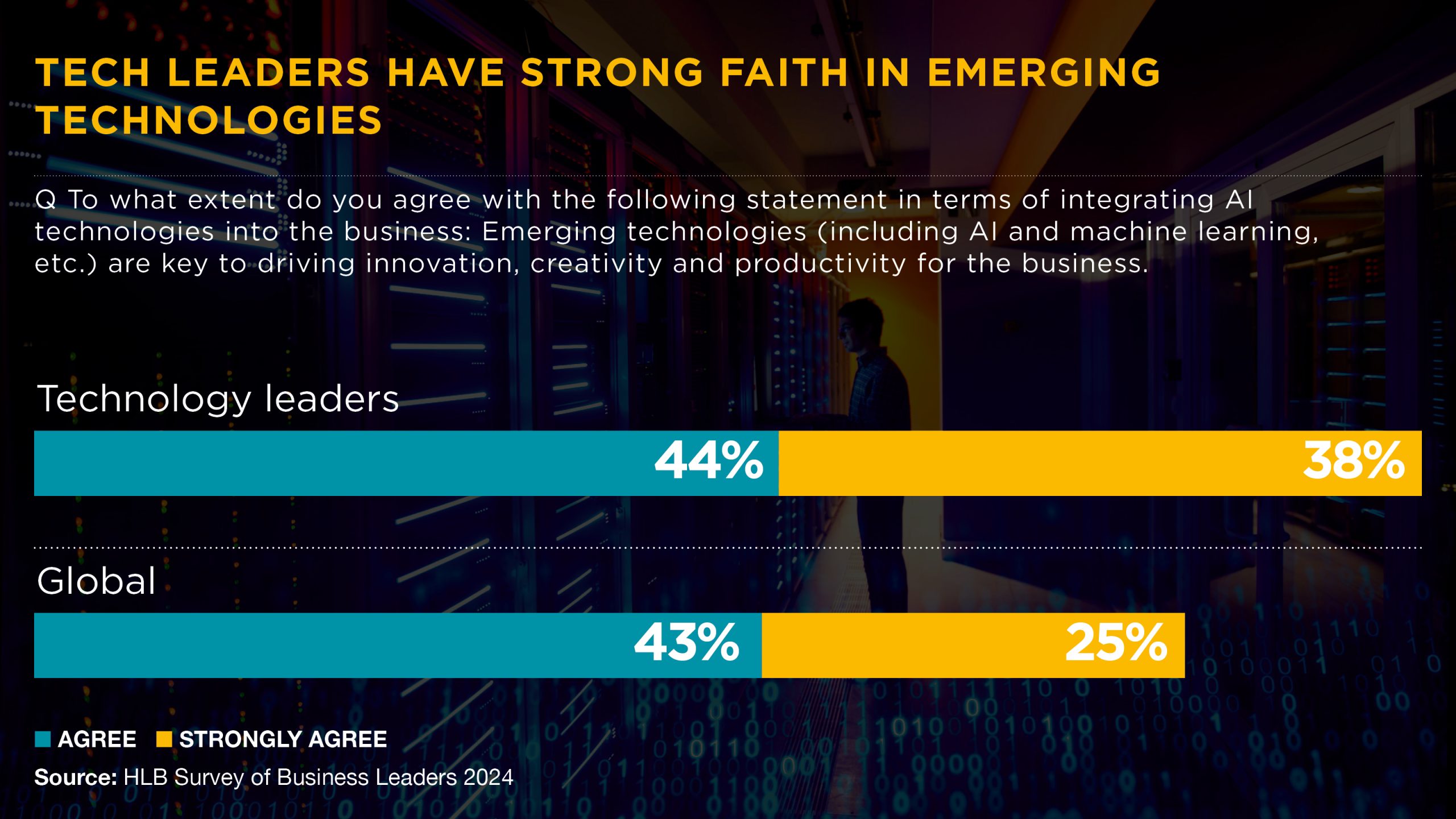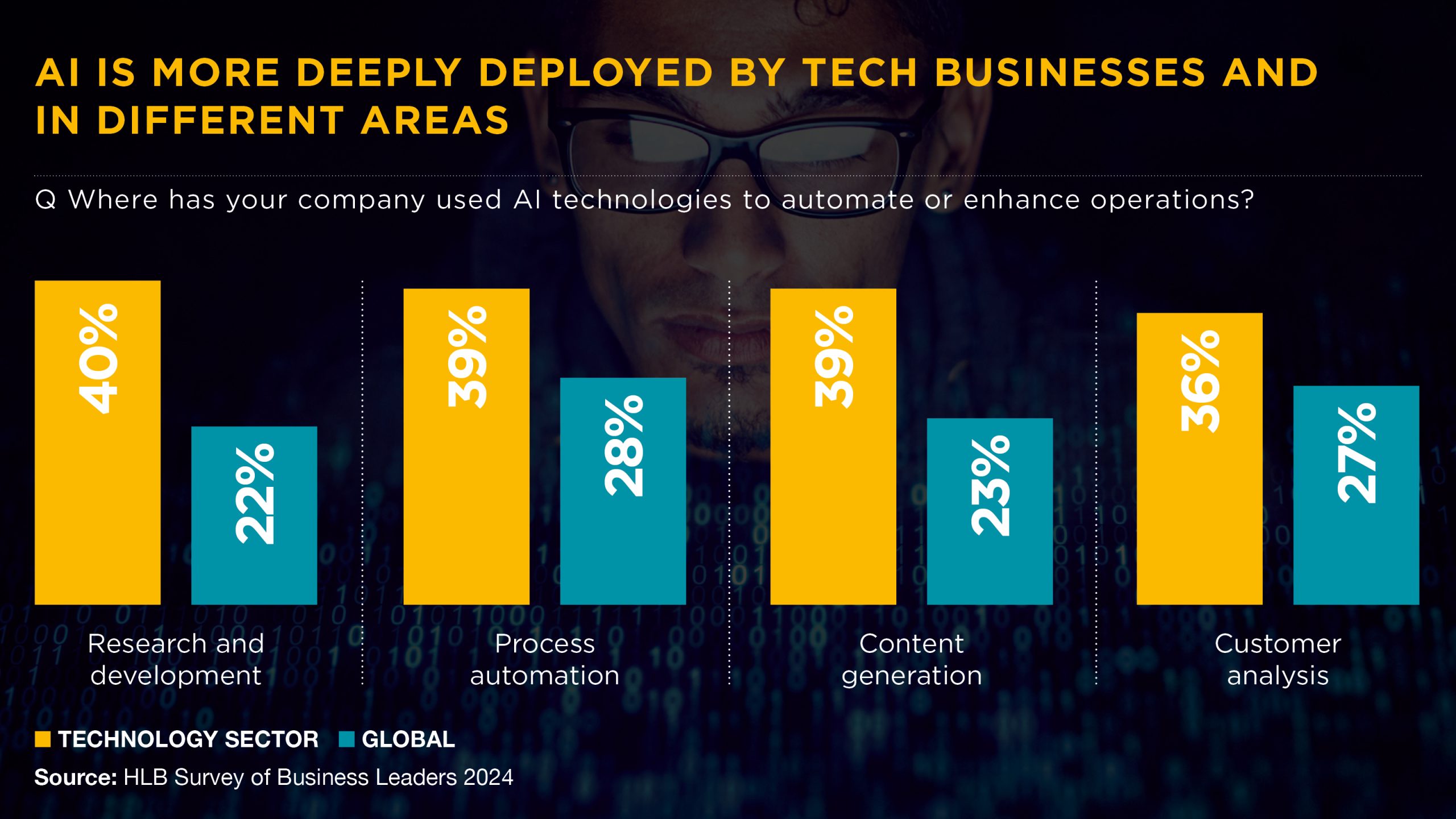Disruption and opportunity
Technology Sector Outlook – HLB Survey of Business Leaders 2024Business leaders are navigating a complex maze of challenges, from inflation to rising geopolitical tensions and the energy crises. At HLB Global, we are keen to help these leaders deal with such challenges and conduct an annual survey to gauge the current sentiment.
Worries about geopolitical risks, cyber threats and the environment have escalated dramatically over the five years since our survey began. However, technology can drive rapid change and open up new opportunities for innovation and efficiencies across all sectors. As a key enabler for business adoption, keeping abreast of new technologies could be essential to ensure survival and success in challenging times.
Below, we look at the views of leaders in the technology sector. We asked them what they will focus on in 2024 and how they will leverage changes to the international business landscape. We also asked them how they are deploying new technologies to innovate and grow, including AI (both in their own businesses and for use by their clients).
Business confidence in the sector is on the rise
Across most sectors, business leaders are confident that the global economy has turned a corner. This is despite a conveyor belt of international crises, from changing geopolitical pressures to resource spikes, climate change uncertainty, misinformation, and risks of social upheaval.
Leaders in the tech sector are slightly less concerned than their global peers about these risks. Still, their top concerns include inflation, as 68% of respondents mentioned, followed by geopolitical risks (67%) and cyber security (65%).
Some risk factors could affect access to and growth of certain technologies, which could, in turn, amplify the social and business impact. This may be why concern about certain risks has increased within the technology sector over the past five years. For example, 54% of respondents are worried about social instability versus 23% in 2019. 52% are now concerned about misinformation versus 44% five years ago, and the percentage of those worried about climate risk has risen from 31% to 57% over the same period.
51% of tech leaders expect the global economy to grow over the next year. This is a sharp increase compared with the 29% who expressed an opinion five years ago when the survey began. These leaders are 10% more confident about global growth than their peers in other sectors.
Tech leaders are also more confident in their ability to grow revenues than their peers across other sectors (93% versus 85%). There is even more of a gap regarding those who are “very confident” in their own company’s ability to grow revenue over the next year (53% vs. 37%).
Tech leaders are keen to embrace change and innovation to drive growth
Our research indicates that tech leaders quickly deploy new technology to make the most of changing situations. For example, 72% have prioritised plans to weave new technologies into their operational model. 68% believe these technologies can improve operational efficiencies, while 60% plan to launch new tech-based products and services this year.
67% of technology leaders think that changes in trade agreements will create opportunities for their businesses. 80% of tech leaders believe technological advancements can help them overcome future cross-border business challenges. This compares to only 63% of their global peers.
61% of leaders believe they can find greener energy sources in the face of political or trade challenges. In comparison, 82% agree that emerging technologies are the key to driving innovation, productivity and creativity for their businesses.

Meanwhile, 72% of leaders are fully prepared to take on more risk by investing in new technologies, given the potential benefits on the other side.
Tech leaders believe that AI is vital for the sector
Within the tech sector, 77% of leaders believe that AI is the most important technology for their businesses over the next five years, versus 65% of the global sample.
Cloud computing also ranks more highly in importance than for global peers over the next five years (70% versus 50%). Cloud will provide the critical infrastructure to help make other technologies for clients and develop their own business applications.
Technology leaders believe that they are the innovators when it comes to AI. Many already use AI-based technologies to develop a competitive advantage while encouraging their peers to do the same.
Also, they’re well aware of the “wave” related to AI tool adoption activities. 17% of those surveyed believe they are leaders in the AI maturity and transformation journey, and a large proportion of respondents in this sector are optimising their integration approach.
Over two-thirds of those questioned already use AI for specific staff training, retooling or upscaling work. They are actively retraining professionals and rapidly moving forward with applied learning solutions. Many are seeking new employees with the skills to support this AI journey. However, talent acquisition is one of the most critical challenges for tech leaders, and many consider this to be a weak area within their businesses, calling for rapid improvement.
One CEO of a European tech firm notes that they are “moving AI development for our products in-house from a currently outsourced position. Skilled people are required, but we are getting them okay.”
Tech experts innovate when it comes to AI deployment
Versus their global peers, technology companies focus on areas that are more likely to support innovation. While business leaders in other sectors may prioritise document processing or process automation, those in the tech sector focus on apps to help with R&D, content generation, process automation and quality control. Perhaps an indication that technology companies have moved on to seek higher value outcomes from their AI investments.

Still, data security issues represent barriers to more than half of respondents, who also mentioned data quality and quantity. These challenges are felt more acutely by leaders in the tech sector.
Perhaps unsurprisingly, fear or resistance to change is the lowest-ranking barrier to AI adoption for business leaders in the technology sector. One technology CEO in APAC has some advice for those embarking on this journey. “Companies need to understand and master the latest digital technology trends, such as artificial intelligence, big data, cloud computing, and blockchain. They should introduce professional technical talents or teams to promote digital transformation and upgrades.”
How HLB can help
In an age of disruptive technology, some entrepreneurs and business leaders are uncertain about their path forward. HLB is a global network of independent advisers and accounting firms dedicated to helping clients grow across borders. We take the time to get to know your business and understand your specific needs. Get in touch with one of HLB’s advisors for advice and practical services to help you to grow your technology business.
Survey of Business Leaders 2024

Learn more about our research






